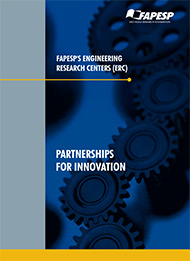Offshore Technology Innovation Center is unveiled at the University of São Paulo

26 de junho de 2024
By Maria Fernanda Ziegler | Agência FAPESP – Shell Brazil, FAPESP, the University of São Paulo (USP) and the Technological Research Institute (IPT) will invest BRL 163 million in the next five years in the Offshore Technology Innovation Center (OTIC), which was unveiled at USP on June 12. OTIC’s mission is to conduct research and development (R&D) relating to more efficient and sustainable technologies for deep-sea production of oil and gas.
“This is the third Applied Research Center [ARC] we’ve launched in partnership with Shell at USP. In this model, we started from the principle that for every dollar of public investment, another dollar is invested by private enterprise. However, experience has taught us that public investment is multiplied by 4.8. This evidences the program’s potential capacity to leverage investment. The results of this public-private cooperation serve both for practical application in the company and also for policymaking and the advancement of basic science to produce scientific knowledge of significance for society as a whole,” said Marco Antonio Zago, President of FAPESP.
Besides OTIC, in recent years Shell and FAPESP have established the Research Center for Greenhouse Gas Innovation (RCGI) and the Center for Innovation in New Energies (CINE).
The latest center has been set up in the context of the energy transition and aims to produce scientific and technological knowledge via connections among industry, government and academia. The changes required in the offshore energy sector can play an important role in the immediate reduction of global carbon emissions.
“The offshore energy industry is undergoing many major changes and needs to move toward more production of energy with lower greenhouse gas emissions. These are major technological challenges, and OTIC aims to contribute to the development of ways and means of enhancing the efficiency of offshore operations and reducing their carbon footprint,” said Kazuo Nishimoto, the new ARC’s Scientific Director.
Five programs
With more than 250 researchers involved, OTIC is to run 24 R&D projects divided into five technical programs that interconnect: New Processes and Operations; Low-Carbon Power; Novel Materials and Nanotechnology; Health, Safety, Environment and Circular Economy; and Digital Transformation. Each area has the potential to generate both practical short-term solutions and disruptive solutions that will transform the offshore industry in the long term.
During the ceremony held to launch OTIC, Olivier Wambersie, Shell Brazil’s General Manager of Technology and Innovation, said the company plans to cut carbon emissions to zero by 2050. “Our goal is to contribute to safer and more sustainable offshore operations. Brazil is a center of excellence for offshore and deep-sea oil and gas production. R&D is crucial to achieve our zero carbon target. Only 50% of the technology needed to get to zero carbon exists right now. OTIC will play a vital role in filling the gap,” he said.
Shell Brazil invests BRL 500 million (now about USD 92 million) per year in research, development and innovation (RD&I), he added. It will invest BRL 49 million in OTIC in compliance with a regulatory requirement to invest in RD&I imposed by the National Oil, Gas and Biofuel Agency (ANP).
Shell ranks second among oil and gas companies in Brazil in terms of investment in RD&I. According to Daniela Godoy Martins Corrêa, ANP’s head of environmental management, the requirement has led to RD&I investment of BRL 30 billion since it came into force 20 years ago, and 50% has been invested in the last five years.
“Almost half of this investment has gone toward RD&I in decarbonization and energy efficiency technologies,” she said.
The unveiling ceremony took place at USP’s Digital Lab and was attended by authorities and researchers, including Carlos Gilberto Carlotti Junior, Rector of USP; Maria Arminda do Nascimento Arruda, Vice Rector of USP; Vice Admiral Celso Mizutani Koga, head of program management for the Brazilian Navy (DGePM); Marco Antonio Zago, President of FAPESP; Olivier Wambersie, Shell Brazil’s General Manager of Technology and Innovation; Flávia Motta, IPT’s Chief Financial and Administrative Officer; Daniela Godoy Martins Corrêa, ANP’s head of environmental management; and Kazuo Nishimoto, OTIC’s Scientific Director.



